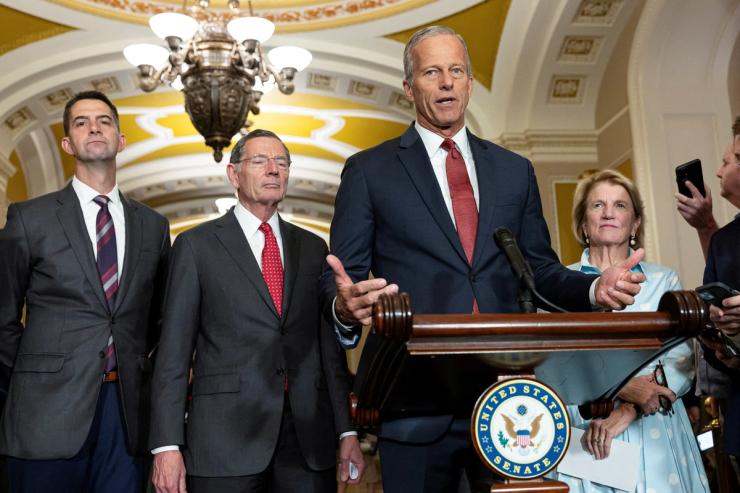The News
GOP senators of all persuasions are balking at their leaders’ still-evolving version of President Donald Trump’s tax and spending megabill, even threatening to stall it on the floor absent more changes to their liking.
And some colleagues of the resistant Republicans think it’s time to force their hands.
“On legislation like this, the only way to know whether you got the votes to get on the bill is to take the vote. You’re having a lot of people say, ‘they can’t vote for the bill, they can’t vote for the bill,’ that in my judgment, will vote for the bill,” Sen. John Kennedy, R-La., told Semafor.
Despite the unrelenting pressure coming from Trump and Majority Leader John Thune to finish the bill before next week’s July 4 recess, there are not currently 50 votes to advance the bill on the floor, multiple senators said after a closed-door lunch on Wednesday.
There’s also not even a complete bill to advance yet, a side effect of the harried last-minute negotiations and parliamentary litigation over its substance. Those talks make it hard for GOP senators to commit to Trump’s marquee legislation — and relatively easy for them to pan it, even as its public approval flounders.
Thune still may be able to use Trump, and his own whipping acumen, to push the bill onto the Senate floor amid the uncertainty. The South Dakotan was noncommittal on Wednesday when asked about a possible vote to proceed to the bill on Friday, although he told senators in private that “we’re on track to start Friday,” according to one attendee.
Kennedy said senators should prepare for one: “Do I think Thune’s going to go forward? Yes.”
“I don’t think the leader wants a failed vote,” said Sen. Lisa Murkowski, R-Alaska, when asked about a possible Friday roll call.
The biggest headache right now is the bill’s projected impacts on rural hospitals. Many Republicans now want to create a fund that would cushion the blow of Medicaid cuts to those hospitals.
The party is nowhere near agreement on the size of the fund, though: Sen. Susan Collins, R-Maine, and several other senators want $100 billion — but conservatives say they can get the job done for one-tenth of that.
“My proposal was $10 billion. I thought we could do it with $6 billion,” said Sen. Rick Scott, R-Fla. “No one’s explained to me why we need a higher amount.”
Thune said ultimately the proposal will not be as large as $100 billion. But several GOP senators said $15 billion, as proposed by the Senate Finance Committee, is insufficient.
Scott was one of several Republicans who said they could not commit to voting to start debate on the bill until they see the final legislative text.
Asked about those concerns in his conference, Thune responded: “Everybody’s going to have their own vote. We’re working with all our members to get everyone comfortable with the bill. And hopefully, in the end, they’ll be there.”
In this article:
Know More
Sen. Josh Hawley, R-Mo., said several of his colleagues made clear during a party lunch Wednesday that they would not support taking up the megabill until “unless we get further clarity on the rural hospital issue and what we’re doing there.”
“They’re not voting to proceed until they get some clarity,” Hawley said. “So I think it’s a problem.”
Count Sen. Thom Tillis, R-N.C., among them. He’s told Senate leaders he cannot advance the bill until he’s gotten “answers on the state-specific Medicaid impacts” on North Carolina from the bill that he can give to his state legislature.
He said holding a procedural vote before everything is locked down “is not out of the realm of possibility, but you’ve got to know that you’re close; I leave that to Sen. Thune.”
Collins said in an interview that she’s one of the undecided, adding that the Senate should take more time, while Sen. Jerry Moran, R-Kan., was noncommittal and said he needs answers on Medicaid and energy questions he has about the bill.
Sen. Ron Johnson, R-Wis., agreed that there are not 50 votes to move forward on the bill, saying that he “can’t” support it without the party going line by line through the bill to figure out what to keep and what to toss.
“I understand the pressure,” Johnson said. “We’re supposed to vote on a motion to proceed? Do you guys understand the absurdity of this?”
Room for Disagreement
There’s a common view among Senate Republicans that all the bellyaching will fade once the bill comes to the floor and they actually have to vote. That proved true for House Republicans last month, particularly once Trump got involved.
“I get that people are continuing to advocate for different things,” said Sen. John Hoeven, R-N.D. “You know how it is. People are going to continue to push … I’m hoping we get it filed and vote on the motion to proceed so we’re on it Saturday. I’m optimistic.”
Burgess’s view
Clinching a deal on rural hospitals may be the key to unlocking the votes of senators like Hawley, Collins, and Tillis. But could that alienate Johnson and Scott, or other like-minded conservatives? Maybe.
Both have been back-channeling directly with Trump, who has shown an ability to convince diehard fiscal hawks to change their minds — in the House, at least.
At this point, it would still be more of a surprise if this bill fails than if it passes. And that’s saying something, since I’ve thought several times over the past few weeks that this bill had little chance of becoming law.
Notable
- Earlier Wednesday, we spoke to Collins about specific changes she wants to the bill.


